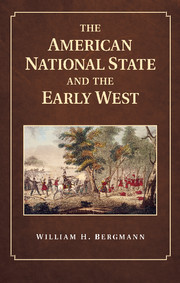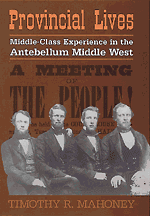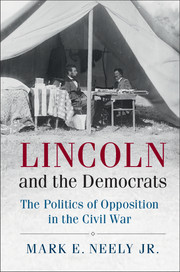The American National State and the Early West
This book challenges the widely held myth that the American national state was weak in the early days of the republic. William H. Bergmann reveals how the federal government used its fiscal and military powers, as well as bureaucratic authority, to enhance land acquisitions, promote infrastructure development and facilitate commerce and communication in the early trans-Appalachian West. Energetic federal state-building efforts prior to 1815 grew from national state security interests as Native Americans and British imperial designs threatened to unravel the republic. White Westerners and Western state governments partnered with the federal government to encourage commercial growth and emigration, to transform the borderland into a bordered land. Taking a regional approach, this work synthesizes the literatures of social history, political science and economic history to provide a new narrative of American expansionism, one that takes into account the unique historical circumstances in the Ohio Valley and the southern Great Lakes.
- Demonstrates the strength of the American government during the early republic
- Shows how state power in the borderlands of the Old Northwest Territory were essential to state building and integration into the federal system
- Takes a regional approach, emphasizing political economy and social history for a new narrative of American expansionism in the Ohio Valley and Great Lakes
Reviews & endorsements
'William Bergmann's deeply researched narrative combines a powerful granular explication of the commercial sinews of Western expansion with a sophisticated understanding of the transatlantic world in which American expansion occurred. To deal with the military and economic challenges that settlers regularly faced, they turned to state and even national governments for security, transportation infrastructure, and, more broadly, economic opportunity in the early republic.' Brian Balogh, University of Virginia
'William Bergmann bravely takes on the persistent notion that the federal government played a minimal role in the expansion of the United States and shows how the emergence of the nation-state and the conquest of the Ohio Valley were mutually reinforcing processes. A must-read for anyone interested in the impact of national power on the development of a continental empire in the half-century after independence.' Andrew Cayton, Miami University, Oxford, Ohio
'Readable, richly researched, and confidently argued, this book takes an unusually patient look at matters historians have long thought we understood. Bergmann's account of what actually occurred on the ground west of the Proclamation Line gives the Native Americans new persistence and agency, Anglo-American pioneers a less heroic role, and intentional leaders or policy makers a greater significance in shaping the postrevolutionary West. Highlighting the contributions of the US government to both military and commercial hegemony in the region, Bergmann shows us a familiar story in a great new light that is compelling, corrective, and important.' John Lauritz Larson, Purdue University
'… reveals the effective power of federal institutions in turning the Indian country of the Ohio Valley into the sovereign territory of the United States during the era from the American Revolution through the War of 1812. Yet Bergmann offers much more than a one-sided story of military conquest on the frontier. In this thoroughly researched and cogent book, the Ohio Valley distinctly emerges as a locus of fierce US–British competition, factious American Indian politics, and tense partnerships between the US government and its own citizens pushing on the margins of a 'rising empire'. Scholars of the early United States, North American borderlands, and US national state formation should take notice of this important contribution to the historiography of US and American expansion.' Adam Rothman, Georgetown University
'Well argued and researched, Bergmann's study brings new perspectives to much-examined episodes … This book should appeal to anyone interested in the transformation of the early national West and the role played by a surprisingly potent federal government.' Daniel Ingram, Ohio Valley History
Product details
May 2014Paperback
9781107449473
300 pages
229 × 152 × 17 mm
0.44kg
3 maps
Available
Table of Contents
- 1. Property war
- 2. Martial economics
- 3. A bordered land
- 4. Webs of commerce
- 5. The national state in Indian country
- 6. Bureaucratic expansionism.





